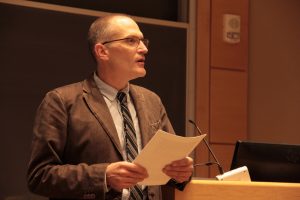Douglas Ambrose, a Charter Fellow of the Alexander Hamilton Institute for the Study of Western Civilization (AHI), and Professor of History at Hamilton College, has been named the Carolyn C. and David M. Ellis Distinguished Teaching Professor of History.

Professor Douglas Ambrose
The chairmanship is one of eight recently announced at the college, and succeeds other recognitions for Professor Ambrose’s teaching, including the Class of 1963 Excellence in Teaching Award and the Student Assembly’s Sidney Wertimer Award for Excellence in Teaching.
Professor Ambrose calls the endowed chairmanship a “humbling honor,” especially given David M. Ellis’s influence both as a popular professor in the 50s, 60s, and 70s, and as a scholar. Ambrose notes that Ellis’s History of New York State (Cornell, 1967) was a standard text for years and his Landlords and Farmers in the Hudson Mohawk Region, 1790-1850 (Cornell, 1946) remained an important work for decades.
Ambrose is particularly grateful because he views teaching as a calling. “The classroom remains for me a sacred place, full of wonder and grace,” he said, and added, “I feel the same excitement walking into it today that I felt in 1990 when I first taught at Hamilton. I remind myself regularly what a gift it is to feel that way after so many years.”
Ambrose’s passion for teaching has touched Hamilton students through the decades. Dean Ball, 2014 Hamilton graduate and an AHI Undergraduate Fellow, and currently Strategic Manager, State and Local Policy, at the Manhattan Institute for Policy Research, says that he considered Professor Ambrose both a mentor and a friend. He recalls his independent study of the Bible with him as “one of the most enriching educational experiences I have ever had.” While referring to the “staggering” range and depth of Professor Ambrose’s erudition, Ball also praises his character, “his authentic care for his students, the respect and honesty with which he so consistently treats others.”
From his Manhattan office, Ball extends “Congratulations to Professor Ambrose for this well-deserved recognition.”
Tim Minella, one of the AHI’s first Undergraduate Fellows, points to Ambrose’s upper-level course on “The Founders and Their Progeny” for sparking his interest in American history. Minella, who earned his degree (Phi Beta Kappa) in physics and government in 2009, went on to earn at the University of South Carolina a prestigious Presidential Scholarship and Ph.D. in the history of science. His dissertation reflects his interdisciplinary interests and focuses on the impact of the Enlightenment and science on the political and intellectual history of the Early Republic.
From Atlanta, where he is preparing for the fall semester of his year as a post-doctoral fellow at the Fox Center for Humanistic Inquiry at Emory University, Minella writes, “Doug Ambrose’s enthusiasm for the study of history and his skills as a teacher greatly enriched my college experience. It is an honor to be counted among his students. There is no one more deserving of the award of an endowed chair than Doug.”
AHI Executive Director Robert Paquette, who has taught alongside Ambrose since Ambrose joined the Hamilton faculty in 1990, called his colleague “a living legend as a teacher at Hamilton College.”
“The AHI is delighted to learn that Hamilton College has honored a Charter Fellow of the AHI for his exemplary qualities as a teacher and scholar by awarding him a distinguished chair named after a Hamilton College history professor, David Ellis, who carved out quite reputation of his own as an influential chronicler of New York State history.”
Ambrose’s teaching and research interests include early America, the Old South and American religious history. His publications include Henry Hughes and Proslavery Thought in the Old South (LSU, 1996) and The Many Faces of Alexander Hamilton: The Life and Legacy of America’s Most Elusive Founding Father (NYU, 2006), a volume he co-edited with Hamilton colleague Robert W. T. Martin, as well as numerous articles, book reviews, and encyclopedia entries about Southern slavery and Southern intellectual life.
Ambrose earned his doctorate in history from the State University of New York at Binghamton under the direction of the late Elizabeth Fox-Genovese. He earned his M.A. from the University of Rochester, where he studied under the late Eugene Genovese, husband to Elizabeth, and one of the most influential historians of his generation.
Ambrose’s other work with students includes serving on the Students Fellowships Committee and as faculty advisor to the Christopher Dawson Society for the Study of Faith and Reason, one of several student organizations sponsored by AHI.
In addition to his teaching and mentoring at Hamilton College Ambrose serves students through the independent AHI, which he co-founded with Professor Paquette and Hamilton Economics Professor (now Emeritus) James Bradfield. He directs immensely popular AHI-sponsored reading groups on religious themes for students each semester, covering works by such authors as Josef Pieper, St. Augustine, and St. Aquinas. He also organizes AHI events and nurtures summer interns.
Both Ambrose and Paquette are also currently engaged in an intellectual labor of love: preserving the legacy of their late professor, Eugene Genovese, the internationally recognized authority on American slavery. Ambrose is working alongside archival librarian Christian Goodwillie and summer intern David Isserman to catalogue the extensive collection on southern history that Genovese bequeathed to AHI.
This summer, Ambrose is editing for publication by Cambridge University Press, a manuscript that Genovese left largely, but not completely, finished when he died in 2012: The Sweetness of Life. The book, which is about the slaveholders’ leisurely activities and folkways , writes Ambrose, provides a fitting coda to Genovese’s life work that began with telling the story of “a great historical tragedy.”
Article by Mary Grabar

Leave A Comment